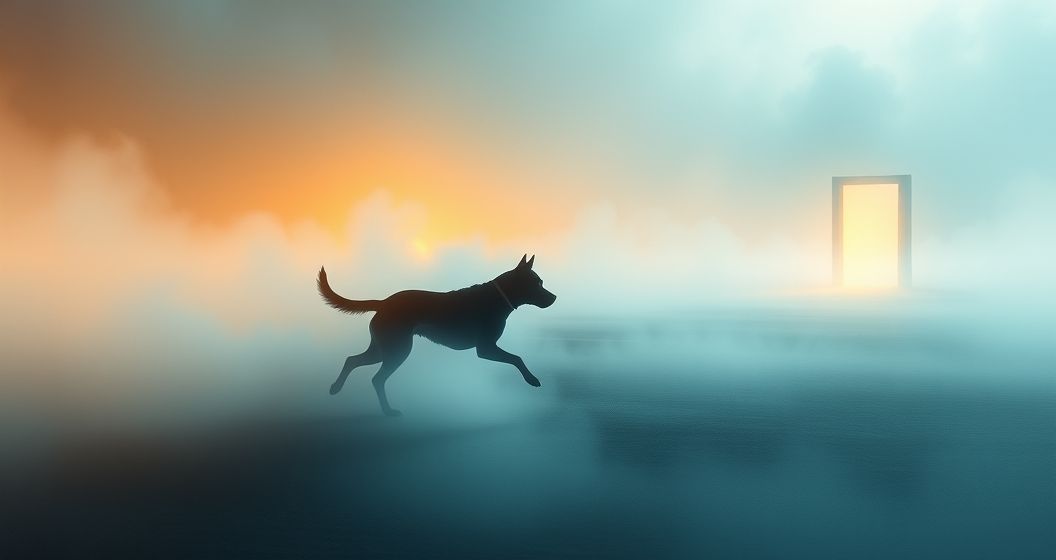Core Symbols: The Dog, Doorway, and Echoes
The dog in dreams carries layers beyond mere companionship—it often mirrors aspects of your inner self or relationships you’re processing. In this specific dream, the dog isn’t just a pet; it’s a symbol of loyalty, intuition, or a part of your identity you’ve outgrown but still feel drawn to. The 'echoes' amplify this: they’re not just visual but emotional, suggesting a memory or feeling that refuses to fade. Doorways, meanwhile, are classic threshold symbols in dreamwork, representing transitions, new beginnings, or barriers between past and present. When the dog disappears through these doorways, leaving only the sound of its footsteps or a faint bark, it’s as if your subconscious is showing you a relationship, opportunity, or even a version of yourself that’s slipped through a metaphorical exit.
Consider the texture of the chase: are you running toward the door, or is the dog leading you? The direction matters. If you’re pursuing, it may signal a longing to recapture something lost. If the dog is guiding, it could represent your intuition urging you toward closure. The key is the 'echo'—not a clear vision, but a residual feeling. This isn’t about literal dogs or doorways but the emotional residue of experiences you haven’t fully processed.
Psychology Lens: Why Your Brain Chases Unseen Phantoms
Want a More Personalized Interpretation?
Get your own AI-powered dream analysis tailored specifically to your dream
🔮Try Dream Analysis FreeNeuroscience tells us dreams are the brain’s way of processing emotional memories during REM sleep, sorting through the day’s experiences to strengthen neural connections. The 'echo' of a dog beyond a doorway might be your mind replaying a moment of connection that felt incomplete—like a friendship that ended abruptly, a project you abandoned, or a part of yourself you buried. From a Jungian perspective, the dog could be an archetype of the 'shadow'—the aspect of yourself you’ve disowned but still seek to integrate. The doorway? A portal to your unconscious, where these unresolved parts reside.
Freud might frame this as repressed desire: perhaps you’re chasing a sense of security or loyalty you once had, now lost. But modern psychology offers a softer lens: dreams like this often arise when life feels unstable. A recent move, job change, or relationship shift can create 'emotional thresholds,' and your subconscious uses the dog-doorway metaphor to process these transitions. Think of it as your mind saying, 'Let’s check in with what we’re leaving behind before stepping forward.'
Life Triggers: When Do These Dreams Strike?
The 'dog door echo' dream thrives on unprocessed endings or beginnings. If you’ve recently moved, the doorways might represent leaving a familiar space, and the dog your attachment to that place or people. A breakup or loss of a pet can trigger this, as your brain tries to reconcile the absence. Even subtle changes—a new routine, a shift in social circles—can feel like 'doorways' in disguise, and the dog becomes the part of you that misses the old rhythm.
Consider someone who quit a job but still feels tied to their team. The dog could be their former colleagues’ loyalty, and the doorways the exit they can’t fully leave. Or a person who ended a friendship but still texts 'just checking in,' creating an 'echo' of what once was. The key trigger is unfinished emotional business—moments where you felt you couldn’t fully say goodbye, or where a relationship ended without closure.
What To Do Next: Turning Echoes Into Actionable Insight
Start with short-term reflection: Grab a notebook and ask, 'What dog-like quality do I need to honor now?' The dog might represent patience, loyalty, or courage you’ve overlooked. Journal the dream’s details: Was the dog friendly or anxious? Did the doorways feel safe or threatening? These details reveal your emotional state. Notice if the 'echo' follows a pattern—maybe it’s tied to a recurring relationship issue.
For medium-term exploration, create a 'threshold ritual.' If the doorways feel like new opportunities, try a small experiment: take a new path to work, join a club, or have a conversation you’ve avoided. This mirrors the 'chase' in your dream but in a controlled, safe way. If the dog feels like a lost part of yourself, ask: 'What would that dog want me to do now?' It might be a hobby you abandoned or a goal you shelved.
In the long term, integrate this insight by processing closure. If the dream is about a person, write a letter you’ll never send, acknowledging their role. If it’s about a part of yourself, create a 'reconnection ritual'—paint, dance, or write as that dog would. Remember, the 'echo' isn’t a warning; it’s a nudge to honor what’s still alive in you.
FAQ
Q: What if the dog in my dream is aggressive?
A: Aggression might signal unprocessed conflict—perhaps with a part of yourself or a relationship. Notice if the aggression feels directed at you or the doorway; it could highlight a boundary you need to set.
Q: Does the color of the dog matter?
A: Yes! A white dog might symbolize clarity or healing, while a black dog could reflect uncertainty or fear. The dog’s coat color hints at the emotional tone of the 'echo' you’re chasing.
Q: Why do the doorways keep changing in my dream?
A: Shifting doorways mirror your evolving priorities or unresolved decisions. If a doorway feels familiar, revisit that memory; if unknown, explore new opportunities your subconscious sees as possible.
